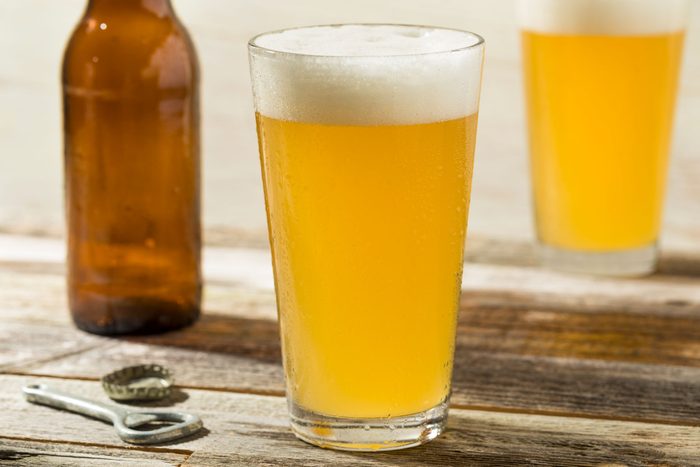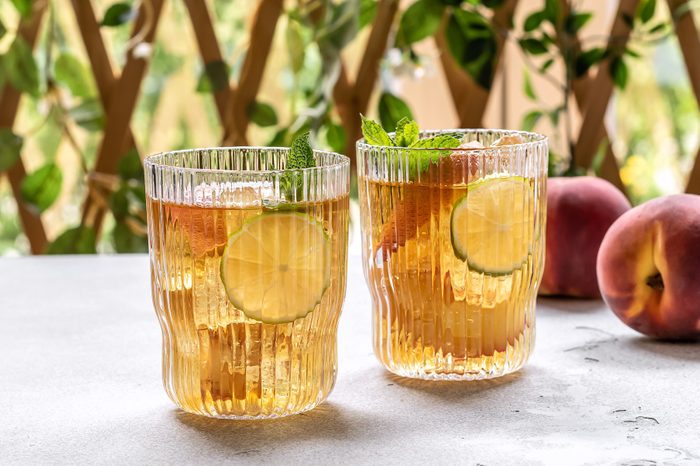
Alcohol is often a central feature of celebrations and social gatherings, thanks to its ability to loosen conversation—and, at least for a moment, inspire a light mood. A National Institutes of Health (NIH) survey in 2021 revealed that 213.2 million Americans older than 18 years have consumed alcohol at some point in their lives. That equates to 84% of American adults, which arguably makes it a worthy inquiry to investigate the healthiest alcohol to drink.
In January 2023, the World Health Organization (WHO) issued a statement emphasizing that there’s no safe level of alcohol consumption. As Carina Ferreira-Borges, PhD, the European regional advisor for Alcohol and Illicit Drugs in the WHO Regional Office for Europe stated in a news release: “We cannot talk about a so-called safe level of alcohol use. It doesn’t matter how much you drink—the risk to the drinker’s health starts from the first drop of any alcoholic beverage. The only thing that we can say for sure is that the more you drink, the more harmful it is—or, in other words, the less you drink, the safer it is.”
However, given that alcohol is an ingrained part of many cultures that history demonstrates is unlikely to vanish, it’s only practical to consider what might the healthiest alcohol. Omar Moussa, MBBA, MD, a gastroenterologist and hepatologist at the Mayo Clinic, points out that alcohol is alcohol, irrespective of its form. Whether it’s 12 ounces of beer, five ounces of wine, or 1.5 ounces of liquor, each standard drink contains the same amount of alcohol.
While no form of alcohol is truly “healthy” in the conventional sense, Dr. Moussa and some liver doctor colleagues suggest that whether you’re a fan of wine, beer, or cocktails, certain types of alcohol may present reduced risk to your health if they’re consumed in moderation.

The healthiest alcohol to drink
This is the healthiest wine to drink, says a liver doctor
Red wine is often regarded to be the healthiest alcoholic beverage, typically due to its antioxidant properties. Moderate consumption of red wine has been associated with a reduced risk of heart disease, as antioxidants from red grapes, like resveratrol, may help safeguard the blood vessels in your heart.
However, cautions Nancy Reau, MD, a hepatologist from Rush University, it’s essential to approach this choice with awareness and caution. “There are many studies that show that any alcohol of any type can increase liver-related complications,” Dr. Reau notes. She adds that red wine’s antioxidants could positively impact liver health for those with a healthy liver, but this liver doctor emphasizes: “Moderation is very important. You still need to stay within the CDC’s recommendations for safe alcohol consumption.”
When you’re choosing red wine, opting for a dry variety can be a good strategy since “dry” translates to the less-sweet end of the scale. This means you’re consuming less sugar and fewer calories, which is better for your blood sugar, sleep health, skin, and more (yes, including your liver, which is affected by sugar).
Julia Zumpano, RD, a registered dietitian at the Cleveland Clinic Digestive Disease Institute explains that while a drier white wine may offer lower calories and carbs, it doesn’t provide as much resveratrol as its red counterpart.

This is the healthiest beer
Light beer could be an appealing option if you’re watching your calorie intake but still want to enjoy a brew. Mike Sevilla, MD, a family medicine physician and member of the Ohio Academy of Family Physicians notes, “In a general sense, healthier beers are those classified as light beers, which have a lower calorie and alcohol content.”
Typically, light beers contain about 4% to 5% alcohol by volume (ABV). Even though they are lower in calories, enjoying beer responsibly is essential—having multiple servings can offset the calorie advantage, not to mention affect cognition, judgment, sleep health, and more.

This is the healthiest liquor
When considering spirits such as vodka, gin, rum, and tequila, Dr. Sevilla suggests these clear liquors are a notable choice for those mindful of their calorie and carb intake. In their pure forms, these spirits contain no carbs and are generally lower in calories than other types of alcoholic drinks. This makes them a better option for those looking to enjoy a drink without overloading on calories.
However, the key factor to consider with spirits is the mixers you blend them with because they “can be packed with calories,” warns Zumpano.
Hard kombucha
While it shares many health benefits with regular kombucha, hard kombucha is fermented to the point when it develops alcohol content. This unique choice may offer probiotics, making it slightly more beneficial than other beverages.
Drinking This Much Alcohol a Week Can Negatively Affect Your Brain

Here’s what you can do
Ultimately, the healthiest approach to alcohol is moderation or abstinence, especially taking into account the recent WHO recommendation. When choosing to drink, options like red wine, light beer, or pure spirits with low-calorie mixers can be slightly better choices.
However, it’s important to remember that the benefits of any alcoholic beverage are significantly outweighed by the risks when consumed in excess. Therefore, being mindful of your consumption, understanding your limits, and consulting healthcare professionals for personalized advice are essential for maintaining a healthy lifestyle while enjoying the occasional drink.
- New Study: White Bread and Alcohol Linked to Colorectal Cancer
- New Research: Using Your Cell Phone This Many Times Each Day Can Seriously Harm Fertility
- New Study: If You Mix These 2 Beverages, You’re Wrecking Your Sleep Health
- New Research: Eating Breakfast at This Hour Lowers Weight and Blood Pressure

